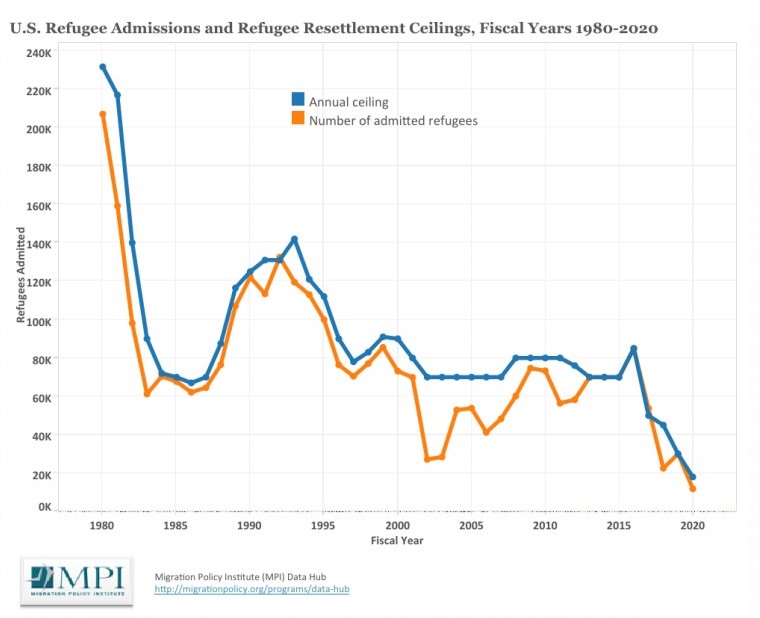As the U.S. government has cut back on its refugee acceptance, Washington state has been doing what it can to welcome those affected into its community.
Highline’s annual “Highline Welcomes the World Week,” a series of events designed to highlight the college’s diverse community, began today with a discussion led by Sarah Peterson, chief of the Office of Refugee and Immigrant Assistance for the Washington state Department of Social and Health Services.
Speaking at the event, Peterson said that the refugee crisis continues to be a global issue the world is forced to grapple with.
“There are actually 80 million people around the world who have been forcefully displaced from their homes,” she said. “But, the definition for a refugee is someone who has actually had to flee their home country. So, there are 26 million refugees worldwide.”

The U.S. annual refugee admission ceiling has fallen from 231,700 in 1980 to just 18,000 in 2020.
Of those 26 million people, the vast majority are living under far less than ideal conditions, many in refugee camps and developing countries, Peterson said.
“Eighty percent of the world’s displaced are living in places that are affected by acute food insecurity and malnutrition,” she said. “First world nations like the United States host less than 10 percent of all refugees worldwide.”
Even for those with access to refugee programs, the chances of being accepted are extremely slim — less than 1 percent of refugees are resettled into safe countries, Peterson said. She compared the process to winning the lottery.
“Not that many countries are participating. In 2019, around 29 countries of the world accepted refugees for resettlement from over 60 different countries,” she said.
One such country is the U.S. Here, the government has been admitting and resettling refugees throughout the country for decades.
But getting through that process is almost never easy.
“It takes a long time for refugees to be able to be resettled in the United States,” Peterson said. “The screening process usually takes anywhere from 18 to 24 months on average, but the reality is for many people it can take years to be resettled.”
The process has also been greatly inconsistent, with the number of refugees let in varying from year to year. That’s because every year, that decision is made by a single person — the president.
“The president of the United States sets what is called our presidential determination for the refugee ceiling,” Peterson said. “Essentially, it’s a number of visas that the United States government will make available to people who are going to come through the U.S. refugee admissions program.”
When the Refugee Act of 1980 was passed following the Vietnam War, increasing the number of refugees admitted annually and formalizing the government’s use of the term, that ceiling was set at more than 230,000 refugees.
In 2020, it was 18,000, the lowest it’s ever been since the Refugee Act’s passing. Peterson said that the current administration under President Biden plans to increase the limit for the coming years.
While the federal government has curtailed its refugee acceptance over the past few decades, Peterson said Washington state has maintained its commitment to refugee resettlement.
“Washington state has a long legacy of welcoming refugees,” she said. “We have eight refugee resettlement agencies — five are located here in the Puget Sound region, and resettle in Snohomish, King, Pierce, and Whatcom counties.”
“Washington is a very diverse place. We welcome refugees from more than 30 different nationalities every year.”
Peterson said Washington has admitted refugees from a wide range of countries over the past several years.
In 2010, the largest groups were from Myanmar and Bhutan. In 2013 and 2014, the concentration shifted to refugees from Iraq and Somalia.
“Over the past four years, we’ve seen pretty significant changes in the numbers of people coming from different communities,” Peterson said. “Refugees from Iraq and Somalia have declined, and we’re seeing a growth in refugees from Ukraine and Special Immigrant Visa holders from Afghanistan.”
Helping integrate these groups successfully into the state community is a major focus of the state government, she said.
“Washington state believes that welcoming refugees is a collective effort. Every year we invest upward of $25 million into local community-based organizations,” Peterson said. “Many are small ethnic organizations that focus on serving a particular community, others are resettlement agencies, others are organizations like Highline College, that is a strong participant in our ESL program, or helping people get access to jobs.”
Through these organizations and community programs, Peterson said the state served nearly 11,000 people last year alone. She said the state’s commitment to community is how it works to ensure the successful resettlement of all its refugees.
“We believe that welcoming refugees really does take a community to help people make sure that they’re able to get jobs, learn English, gain their citizenship, and become part of our communities,” Peterson said. “We really appreciate everything that Highline College does to be a global community and to be a welcoming place.

